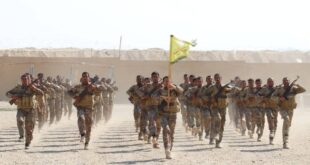China’s government said Monday it will impose sanctions on U.S. military contractors including Boeing’s defense unit and Lockheed Martin for supplying weapons to rival Taiwan, stepping up a feud with Washington over security and Beijing’s strategic ambitions.
Raytheon Technologies Corp. and “relevant American individuals” associated with the sales also will be affected, said Foreign Affairs Ministry spokesman Zhao Lijian. He gave no details of what penalties might be imposed or when.
The ruling Communist Party claims Taiwan, which split with the mainland in 1949 during a civil war, as part of its territory and has threatened to invade. Washington promised in the 1980s to reduce and eventually end weapons sales to Taiwan but insists its dispute with Beijing must be settled peacefully.
“In order to safeguard national interests, China decided to impose sanctions on the American companies that were involved in arms sales to Taiwan,” Zhao said at a regular news briefing.
Chinese-U.S. relations have plunged to their lowest level in decades amid disputes about security, technology, the coronavirus pandemic and human rights.
Taiwan has long been an irritant in relations. Washington has no formal relations with the island’s democratically elected government but is its main ally. U.S. law requires the government to ensure Taiwan can defend itself. Weapons sales to the island have increased in quantity and quality.
Last week, Beijing demanded Washington cancel a planned sale of 135 precision land-attack missiles valued at more than $1 billion to improve its defenses. The sale “seriously undermined China’s sovereignty and security interests,” Zhao said.
China has stepped up military activity around Taiwan in an attempt to force concessions from the pro-independence administration of President Tsai Ing-wen. The Communist Party is using the mainland’s growing economic weight to pressure other governments to cut diplomatic and unofficial ties with Taiwan.
Beijing regularly pressures American companies, including Boeing, in an effort to influence U.S. policy. China is one of Boeing’s biggest markets for commercial aircraft, which might make it vulnerable to a boycott, but Zhao mentioned only Boeing’s military arm, Boeing Defense, not its civilian jetliner business.
Lockheed Martin and Raytheon also supply radar and other technology for civilian aviation.
The two governments have put sanctions on companies and individuals on both sides over complaints about human rights, computer hacking and other issues, though it is unclear whether they have any effect.
Washington has imposed travel and financial bans on Chinese officials and companies it says are linked to abuses in the northwestern region of Xinjiang, where Muslim minorities have been detained in re-education camps, or Hong Kong after Beijing tried to tighten control by imposing a national security law.
Beijing has retaliated by announcing sanctions against some U.S. legislators.
Zhao called on Washington to “stop arms sales to Taiwan and stop any military interaction with Taiwan,” adding: “We will continue to take necessary measures to safeguard national sovereignty and security interests.”
 Eurasia Press & News
Eurasia Press & News



